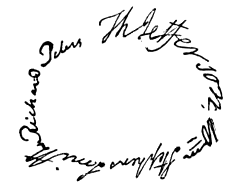An Interlude at Dolly’s Chop House, [21 March?] 1786
An Interlude at Dolly’s Chop House
½ past 2——Dolly’s
One among our many follies
Was calling in for steaks at Dolly’s
Whereby we’ve lost—and feel like Sinners
That we have miss’d much better dinners
Nor do we think that us ’tis hard on
Most humbly thus to beg your pardon
And promise that another time
We’ll give our reason not our rhime
So we’ve agreed—our Nem: Con: Vote is
That we thus jointly1 give you notice
For as our rule is to be clever
We hold it better late than never

MS unavailable. Text and reproduction of signatures from Magazine of American History with Notes and Queries, iii (1879), 44–5, where, under the title “A Diplomatic Round Robin,” the circumstances of the writing of this extempore verse are given as follows: “This amusing trifle, signed by men whom we are taught to revere as grave and reverend seniors, is in the possession of Charles Bruff, of Brooklyn, to whom we are indebted for its reproduction.—Mr. Jefferson, then our minister to France, had been a short time before called by a private letter of Mr. Adams, then our minister at London, to consult upon the terms of treaties with Portugal and Algiers. This letter was carried by Mr. Smith, then Adams’ Secretary of Legation, and later the husband of his only daughter. Jefferson returned with him to London, where they met Richard Peters, well known in revolutionary history as Secretary to the Board of War, later as Judge of the U.S. Court in Pennsylvania, and celebrated for his dry wit and humor.—It seems that these convivial spirits had engaged to dine with Mr. Adams on the evening of Saturday, the 25th of March, but were led astray by the attractions of Dolly’s chop-house, long famous for its good cheer. There, at half past two o’clock on Sunday morning, the rhyme … was written. It is supposed to be in the handwriting of Col. Smith, but to have been dictated by Mr. Peters. It is addressed to ‘His Excellency John Adams, &c., &c., corner Brooks Street, Grosvenor Square.’—It is amusing to read in the diary of John Adams that he dined with Richard Peters and a distinguished company at the table of the Bishop of St. Asaph’s that same Sunday evening. The names of Jefferson and Smith do not appear in the list of the guests. We notice their absence without comment. The reader may draw his own conclusions.—Editor.” The MS is in Smith’s hand, and is signed by the three men. But the evidence for the conclusion that they “had engaged to dine with Mr. Adams” seems to rest only on the inference drawn from the doggerel itself. So, too, with the inference that this engagement was for “Saturday the 25th of March” and that the piece was written in early morning instead of early afternoon. These inferences cannot be verified, and at least one of them seems to be invalidated by the sole reference made to Dolly’s Chop House in TJ’s Account Book during his London stay: on 21 Mch. he “paid dinner at Dolly’s 6/.” Thus it was evidently on Tuesday, 21 Mch., the day he paid a shilling “for seeing the learned pig,” that TJ and his companions dined at Dolly’s. If this is correct, then the inference about TJ’s absence from the list of guests at the home of Jonathan Shipley, Bishop of St. Asaph, friend of Franklin and of the American cause, on Sunday evening, 26 Mch.—an inference unwarranted in any case—falls of course (see Adams, Works, ed. C. F. Adams, iii, 393, where the dinner guests are named; others, unidentified, came in after dinner “according to the fashion in this country”). In view of TJ’s meticulous accuracy in recording all expenditures, the presence of an entry for dinner at Dolly’s on the 21st and the absence of an entry for dinner anywhere on the 25th may be regarded as conclusive as to the date. Some of the entries in the Account Book for London dinners may place the six shillings paid at Dolly’s on the 21st in proper perspective: 22 Mch.: “paid … dinner &c. [at Windsor] 11/”; 24 Mch.; “paid for dinner 3/”; 27 Mch.: “paid for dinner at London tavern 14/6”; 20 Apr.: “dinner 10/6.” These constitute all of the entries for dinners in London; those recorded on the tour of English gardens early in April are not included. During his stay, TJ dined often with the Adamses, and was invited to other homes as well. The following entries in Adams’ diary are of interest: “[Mch.] 29. Wednesday. Dined at Mr. Blake’s. Mr. Middleton and wife, Mr. Alexander and Mrs. Williams, Mr. Jefferson, Colonel Smith, and my family. 30. Thursday. … Dined at Mr. Paradise’s. Count Woronzow and his gentleman and chaplain, M. Soderini, the Venetian minister, Mr. Jefferson, Dr. Bancroft, Colonel Smith, and my family. … [Apr.] 15. Saturday. Dined with Mr. Brand Hollis, in Chesterfield Street. … Our company were Price, Kippis, Bridgen, Romilly, and another, besides Jefferson, Smith, and myself.—18. Tuesday. Yesterday, dined here Mr. Jefferson, Sir John Sinclair, Mr. Heard, Garter King at Arms, Doctor Price, Mr. Brand Hollis, Mr. Henry Lloyd of Boston, Mr. Jenings, Mr. Bridgen, Mr. Vaughan, Mr. Murray, Colonel Smith” (Adams, Works, ed. C. F. Adams, iii, 393–6; for an excellent account of one of the ardent friends of America who was host to TJ in London, see Caroline Robbins, “Thomas Brand Hollis, 1719–1804: English Admirer of Franklin and Intimate of John Adams,” Am. Phi. Soc., Procs., Vol. 97 [1953], p. 239–47).
1. This word interlined in substitution for “early,” deleted.

![University of Virginia Press [link will open in a new window] University of Virginia Press](/lib/media/rotunda-white-on-blue.png)
